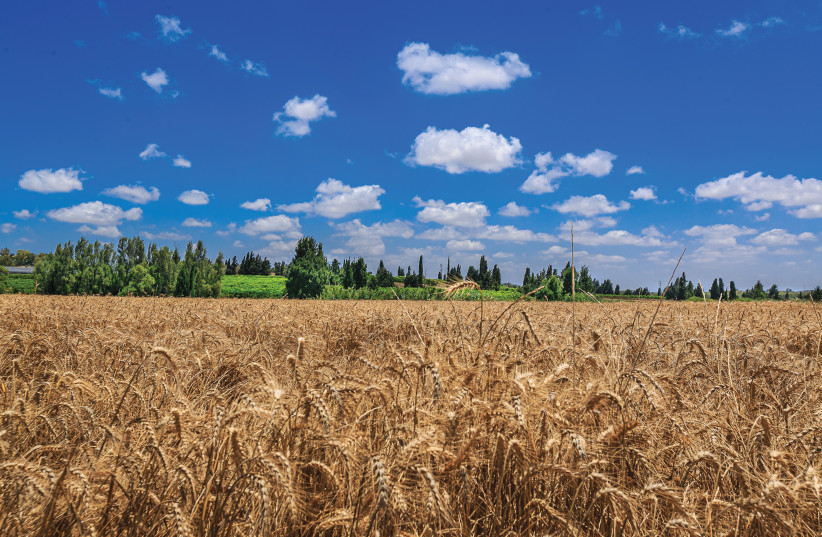July may be the hottest month in 120,000 years, according to an analysis published Thursday by a climate scientist at Germany’s Leipzig University. But none of us need that stat to know that extreme weather conditions are becoming more common, and climate change is no longer an abstract threat somewhere far in the distant future. It’s here.
One of the biggest challenges in combating climate change is that global hunger and climate change are often inversely correlated – we tackle one problem at the risk of exacerbating the other.
One Israeli agritech company has made it a priority to fight both epidemics at once. Rehovot-based Grace Breeding develops all-natural, biological-based fertilizers that have been proven to boost yields while using only half the amount of nitrogen required by standard fertilizers.
But what’s the benefit of less nitrogen?
Nitrogen is an extremely important chemical common in a wide range of fertilizers that are used across the globe on everything from cereal crops, leafy and root vegetables, fruits, legumes, and more. Nitrogen is crucial for a plant’s growth, as it’s a primary component in proteins, enzymes, and chlorophyll, which translate to larger yields. But nitrogen is also extremely harmful to the environment because it emits greenhouse gases that find their way into soil, air, and even waterways, where they can seriously disrupt aquatic life and create a phenomenon known as dead zones.
The environmental toll nitrogen-based fertilizers take is seen as necessary because they help us feed a growing population. And while this is true, food insecurity is still on the rise across the globe. By only requiring half the amount of nitrogen, Grace Breeding’s alternative bio-fertilizers protect the environment by replacing climate-harming synthetic fertilizers. The bio-fertilizers also protect crops from climate change stressors, such as unusually hot temperatures, while supporting profitable crop production for farmers.

Over the last year, Grace Breeding’s MAOZ bio-fertilizer solution underwent a number of field and greenhouse tests on corn plants in Brazil, showing a 10% bump in yields while using 50% less nitrogen. Eurofins, a leading organization providing testing and support for environment products, led the evaluation efforts behind the MAOZ trials in Brazil (in collaboration with the University of Londrina) and published a report analyzing the potential financial impact.
Eurofins concluded that MAOZ can save a mid-size farm of 5,000 hectares in Brazil a potential $1.25 million in annual costs.
How did they arrive at those figures? The MAOZ bio-fertilizer provides three streams where farmers can either earn additional income or save on costs.
Based on July 2023’s corn market prices, farmers can earn an additional $140 per hectare thanks to the 10% rise in corn yields. And since MAOZ has proven to boost carbon sequestration — the practice of capturing and removing harmful CO2 from the atmosphere — farmers can leverage the existing carbon credit infrastructure available in much of Brazil to sell carbon credits on the open market, equaling around an additional $50 per hectare.
Farmers can save anywhere from $40-80 per hectare on operational costs since MAOZ only requires one spray per crop season, as opposed to most other fertilizers that typically require at least two.
Grace Breeding’s MAOZ bio-fertilizer features a natural, non-pathogenic bacteria to allow crops to naturally boost efficiency, reducing the need for chemical fertilizers. This creates a valuable resource in the fight against climate change and hunger, which both require urgent action.
Following its successful field studies, Grace Breeding also received its first national product registration in Brazil in May 2023. A month later, Austria also approved Grace Breeding’s bio-fertilizer to enter its market, enabling accelerated approvals in other EU member states. These initial registrations mark a huge milestone for the Israeli agritech company as they seek to conduct more trials on more crops across the globe.
It’s been a busy few months for Grace Breeding — In June, the company released results from another field trial from Brazil. This time, it was on soybean plants using the company’s ProMagen bio-activator formula, which showed a boost in yields by six bags per hectare, a value of $130.
As Grace Breeding looks to keep the momentum going, it’s this kind of Israeli innovation that is needed to provide a global impact. Without companies like Grace Breeding that recognize the interwoven nature of climate change and agriculture, there is no real way to address both of these massive challenges, either individually or in unison.